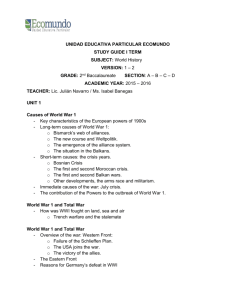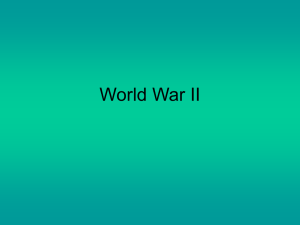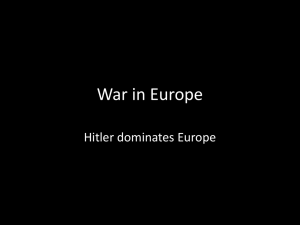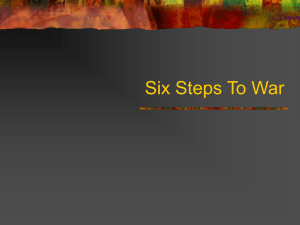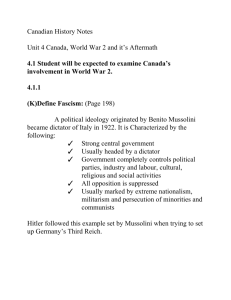Ch 15 Section 4 - Aggressors Invade Nations
advertisement
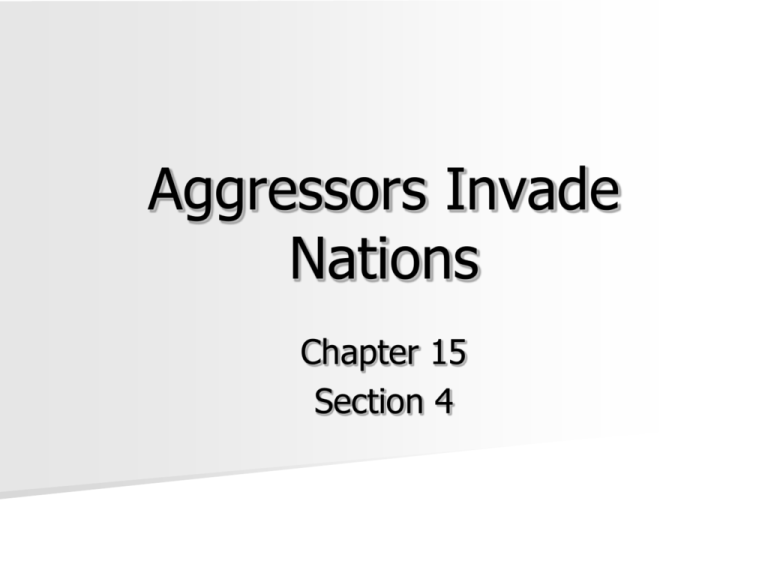
Aggressors Invade Nations Chapter 15 Section 4 Main Idea As Germany, Italy and Japan conquered other countries, the rest of the world did nothing to stop them. Many nations today take a more active and collective role in world affairs, as in the United Nations. Introduction By the mid 1930s, Germans were determined to have a military conquest. The major democracies were distracted by economic problems at home and wanted peace. – Britain, France and the United States Japan Seeks an Empire During the 1920s, Japan’s government became more democratic. It signed a treaty to respect China’s borders and a pact to renounce war. However, its constitution put strict limits on the powers of the prime minister and the cabinet. Civilian leaders had little control over the armed forces. Military leaders reported only to the emperor. Militarists Take Control of Japan As long as Japan remained prosperous, the civilian government kept power. Once the Great Depression struck, the people blamed the government. Military leaders gained support and won control of the country. The militarists wanted to restore traditional control of the government to the military. Taking Control Made the emperor the symbol of state power. Keeping Emperor Hirohito as head of state won popular support. Like Hitler and Mussolini (Il Duce), Japan’s militarist were extreme nationalists. Wanted to conquer China to solve economic crisis. – Also, provide Japan with raw materials and market for its goods. Japan Invades Manchuria Japanese businesses had heavily invested in Manchuria, a province of China. Rich in iron and coal. Japan takes over. Builds mines and factories. Challenge to League of Nations. League is furious. Japan withdraws from League in 1933. Japan Invades China Despite China’s large number of soldiers, the Japanese easily took over part of northern China. The Japanese were better equipped and better trained. Chinese guerrillas led by China’s Communist leader, Mao Zedong, continued to fight the Japanese in the conquered area. 1900 1905 1937 1941 European Aggressors on the March The League’s failure to stop the Japanese encouraged European Fascists to plan aggression of their own. Fascism – a political movement that promotes an extreme form of nationalism, a denial of individual rights, and a dictatorial one-party rule. – Emphasizes loyalty to the state and obedience to its leader. Mussolini Attacks Ethiopia Ethiopia was one of Africa’s three independent nations. 1935 – Mussolini orders an invasion of Ethiopia. League Does Nothing Attacking Ethiopia went against the policy of the League. Ethiopia’s emperor begged for help. League did nothing. Britain let Italian troops through the Suez Canal. Britain and France thought that if they gave into Mussolini in Africa that it would keep the peace in Europe. Hitler Defies Versailles Treaty Hitler had long pledged to undo the Versailles Treaty. The treaty had limited the size of Germany’s army. March 1935 – Hitler announces that he is not going to obey. League basically slapped his hand. Defiance The League’s failure to stop Hitler from rearming convinced Hitler to take greater risks. Treaty had also banned Germany from entering a 30 mile zone on either side of the Rhine River (Rhineland). March 7, 1936 – Germany enters Rhineland. Appeasement The French were unwilling to risk war. The British urged appeasement, giving in to an aggressor to keep peace. French and British do not challenge Hitler. He later admitted that he would have backed down, if he had been challenged. Appeasement Reoccupation of the Rhineland The German reoccupation marked a turning point in the march toward war. 1. It strengthened Hitler’s power and prestige within Germany. 2. The balance of power changed in Germany’s favor. France and Belgium were now open to attack. 3. The weak response from France and Britain encouraged Hitler to speed up his expansion. Axis Powers Hitler’s strength convinced Mussolini that he should seek an alliance with Germany. Hitler agrees. One month later, Germany makes an agreement with Japan. Germany, Italy and Japan = Axis Powers. Civil War Erupts in Spain Spain was a monarchy until 1931, when it became a republic. 1936 - Army leaders favored a fascist style government. General Francisco Franco led the revolt. Hitler and Mussolini aided Franco. 1939 – Franco becomes Spain’s Fascist dictator. Democratic Nations Try to Preserve Peace Britain and France continued to not take a stand against Fascist aggression. Both countries were having economic problems. Neither wanted another world war. United States Follows an Isolationist Policy Isolationism – the belief that political ties to other countries should be avoided. – Many Americans supported this view. 1935 – Congress passed three Neutrality Acts. – Banned loans and sale of arms to nations at war. The German Reich Expands November 5, 1937 – Hitler announced his plans to absorb Austria and Czechoslovakia into the Third Reich (German Empire). 1938 - Germans annexed Austria. What did France and Britain do? Nothing Czechoslovakia Hitler moves on to Czechoslovakia. Three million Germans lived in the western border called the Sudetenland. The Sudeten Germans quickly developed pro-Nazi feelings. September 1938 – Hitler demands that the Sudetenland be given to Germany. Czechs ask France for help. Britain and France Again Choose Appeasement Mussolini proposed a meeting for Germany, Italy, France and Britain in Munich, Germany. – Munich Conference (9/29/1938) Czechs were not invited. British Prime Minister, Neville Chamberlain, believed that appeasement was the solution. – Give into Hitler’s demand. Appeasement Britain and France agree that Germany could have the Sudetenland. Hitler agrees to respect the new borders of Czechoslovakia. Winston Churchill, member of parliament and future prime minister, disagreed with Chamberlain. – He strongly opposed appeasement and warned the public of its consequences. Six Months Later Hitler takes Czechoslovakia. Mussolini seizes Albania. Hitler demanded that Poland return the former German port of Danzig. Poles refused and looked to France and Britain for aid. Hitler was certain that neither nation would risk war due to their practice of appeasement. Nazis and Soviets Sign Nonaggression Pact Britain and France asked the Soviet Union (led by Joseph Stalin) to join them in stopping Hitler’s aggression. Stalin began talking with Hitler. Hitler and Stalin, both dictators, reached an agreement. Pledged to never attack one another. August 23, 1939 – signed the nonaggression pact. War appeared inevitable.

